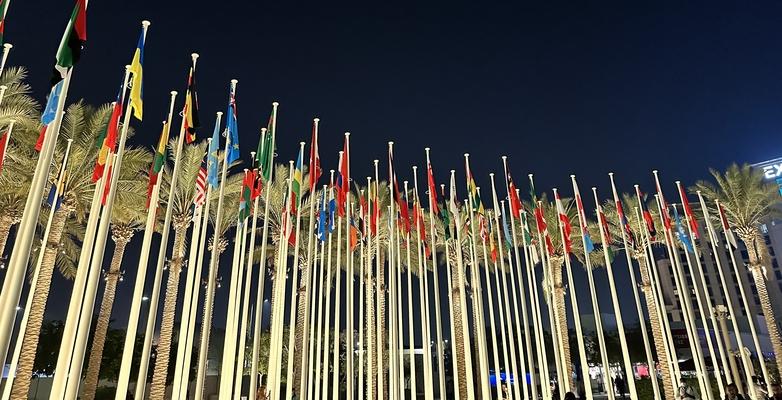
All to Play for at COP 28
4 min read
Opening the Saturday evening session taking stock COP 28's progress so far, the gravelly voice of the much-criticized COP president, Dr. Sultan Al Jaber, had the sound of clock hands ticking.
"I am very committed to delivering a paradigm shift led by the science that keeps 1.5 in reach," he said, "That said, there are still more areas of divergence than agreement. The window is closing to close the gaps. We are making progress, but not fast enough and not satisfying enough. My message to parties is very simple: Work faster. Work Smarter. Work harder."
One of the major gaps – and the issue that will define the success or failure of this year's negotiations – is around fossil fuels.
In January, when Al Jaber was appointed to lead UN climate talks in the United Arab Emirates, one of the world's biggest oil producers, the prospect of a deal to phase out fossil fuels seemed almost laughably improbable.
But that was before almost a year of withering criticism from civil society on the appointment. And a year when a seemingly nonstop series of press stumbles revealing millions spent on blue-chip public relations to burnish the president's image or plans to use COP 28 to advance oil and gas deals smashed headlong into the UAE's desire to emerge from the summit with the reputation of a new and forward-looking leader for the region.
It was also before the hottest year on record laid bare the stakes of failure in relentless heatwaves, catastrophic floods, and wildfire smoke choking the skies from North America all the way to Europe.
Whatever the constellation of factors, they've led to a COP with talks infused with fresh urgency where – with just a few short days to go – several options for phasing out fossil fuels are still in the draft agreement.
Over 100 nations including the EU have already signaled their support for a phase out and there is a growing sense among the civil society groups gathered in Dubai that we might dare to hope such an agreement could become possible.
The Oil Producers Are Not Going Quietly
Perhaps the strongest reason for hope is the alarm bells sounding at the oil cartel OPEC.
On Friday, leaked letters showed the secretariat warning its's 13 member nations with "utmost urgency" that "pressure against fossil fuels may reach a tipping point with irreversible consequences" in current talks.
The same letters laid out the cartel's messaging strategy, urging members to "proactively reject any text or formula that targets energy i.e. fossil fuels rather than emissions."
Russia and Saudi Arabia have also publicly rejected any talk of phaseout and reports suggest that OPEC’s plea is holding among several large fossil fuel producers.
But there is a feeling of a tide turning, with major economies reacting angrily to the OPEC position. As French Energy Minister Agnès Pannier-Runacher told reporters, "I am stunned by these statements from OPEC. And I am angry. OPEC's position endangers the most vulnerable countries and the poorest populations who are the first victims of this situation."
Not All Options Are Good Options
The obstacles to a truly effective deal on phaseout are not just the petrostates. There are also the terms. As Espen Barth Eide, the Norwegian minister of foreign affairs currently leading negotiations on mitigation alluded to in the Saturday stocktake, there is broad recognition among countries of the need for energy transition. Where they diverge is how and how quickly.
Perhaps the biggest sticking point is around the concept of "unabated" fossil fuels, mainly referring to those operating without carbon capture, utilization and storage technologies (CCUS) to trap and sequester emissions.
One of the current options in the text includes language calling for "A phase-out of unabated fossil fuels recognizing the need for a peak in their consumption in this decade and underlining the importance for the energy sector to be predominantly free of fossil fuels well ahead of 2050."
If there's any technology fossil producers love in climate discussions, it's CCUS, largely because, as they're concerned, it gives them license to keep drilling and burning far into the future.
The trouble is that this belief is entirely fanciful for an expensive technology yet to be proven at scale. As the International Energy Agency notes, that if fossil fuel operators realize current plans for drilling and expansion, the staggering amount of electricity required for enough CCUS to keep warming to 1.5 degrees "is more than global electricity demand in 2022. And it would require over USD 3.5 trillion in annual investments all the way from today through to mid-century, which is an amount equal to the entire industry’s annual average revenue in recent years."
We Need a Deal to Phase Out All Fossil Fuels at COP 28
The bottom line is that we need a deal to phase out all fossil fuels at this year's COP. Not just abated. Not just coal. All fossil fuels.
In what negotiators have termed, "this critical deal," it also might be our last chance to get such a deal in time to make a difference. Miss this window and – according to COP 26 President Alok Sharma – we risk sliding into climate breakdown.
The good news is that it might, just might be possible. No one is chilling champagne just yet, much less uncorking bottles, but in this last week there is hope that we may finally get the breakthrough the planet so desperately needs. The clock is ticking.
Stay up to date with the latest from COP 28 by signing up for our digital advocate list today.




